試す 金 - 無料
Should people feed wildlife?
The Week Junior Science+Nature UK
|Issue 71
Giving food to wild animals can help them survive, but it might be harmful to their health.
-

In villages, towns and cities, lots of different animals have had to adapt to living alongside humans. Badgers, birds and foxes are some examples of species that have learned how to survive in these environments. Many people enjoy seeing these animals out and about near where they live, and like to leave bits of food out for them to eat. Whether it’s seeds in a bird feeder or some tinned food left out for a fox, it’s a fun way to connect with wildlife. However, other people think it’s better to leave animals alone.
Lend a helping hand
Some times of the year are particularly tough for certain creatures. In winter when the ground is very cold and hard, or when it hasn’t rained for a long time, it’s difficult for animals like foxes and badgers to find insects and earthworms. Giving animals food can help them to get through these periods when their natural food sources are harder to find.
Leaving food out for animals may also encourage biodiversity, which is the variety of wildlife in a particular area. A study has shown that people in the UK have seen a more diverse range of bird species in their gardens since 1970, which scientists have linked to more people using bird feeders.
Connecting with nature
このストーリーは、The Week Junior Science+Nature UK の Issue 71 版からのものです。
Magzter GOLD を購読すると、厳選された何千ものプレミアム記事や、10,000 以上の雑誌や新聞にアクセスできます。
すでに購読者ですか? サインイン
The Week Junior Science+Nature UK からのその他のストーリー

The Week Junior Science+Nature UK
FIGHTING THE FREEZE
Claire Karwowski uncovers nature's wildest ways of fighting the winter freeze.
6 mins
Christmas 2025
The Week Junior Science+Nature UK
Cook up bioplastic decorations
Make your own eco-friendly ornaments.
1 min
Christmas 2025

The Week Junior Science+Nature UK
Should we switch off Christmas lights?
They brighten up the festive season, but they can have a negative impact on the environment.
1 mins
Christmas 2025
The Week Junior Science+Nature UK
Three spectacular illuminations
Glow Wild, Wakehurst
1 min
Christmas 2025

The Week Junior Science+Nature UK
THE LAST DAYS OF POMPEII
For the first time, an immersive exhibition about the destruction of the ancient Roman city of Pompeii has opened in London.
1 min
Christmas 2025

The Week Junior Science+Nature UK
Wildlife watch
Jenny Ackland unveils a winter wonderland of natural delights this festive season.
1 mins
Christmas 2025
The Week Junior Science+Nature UK
Make Snow globes
Create the perfect Christmas gift.
1 min
Christmas 2025

The Week Junior Science+Nature UK
Maggie Aderin-Pocock
Meet the scientist \"blasting off into space\" at the Christmas Lectures.
3 mins
Christmas 2025
The Week Junior Science+Nature UK
Make vegan eggnog
Whip up a dairy-free festive winter warmer that is perfect for cold nights.
1 min
Christmas 2025

The Week Junior Science+Nature UK
Octopuses
Meet the colour-changing, shape-shifting, fortune-telling aliens of the seas.
2 mins
Christmas 2025
Listen
Translate
Change font size
